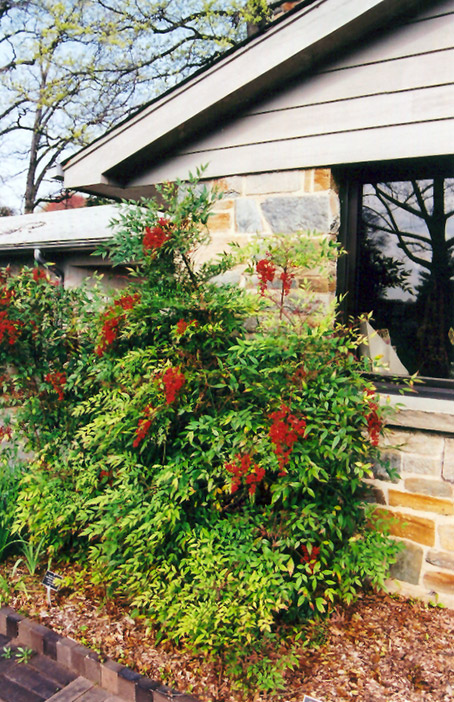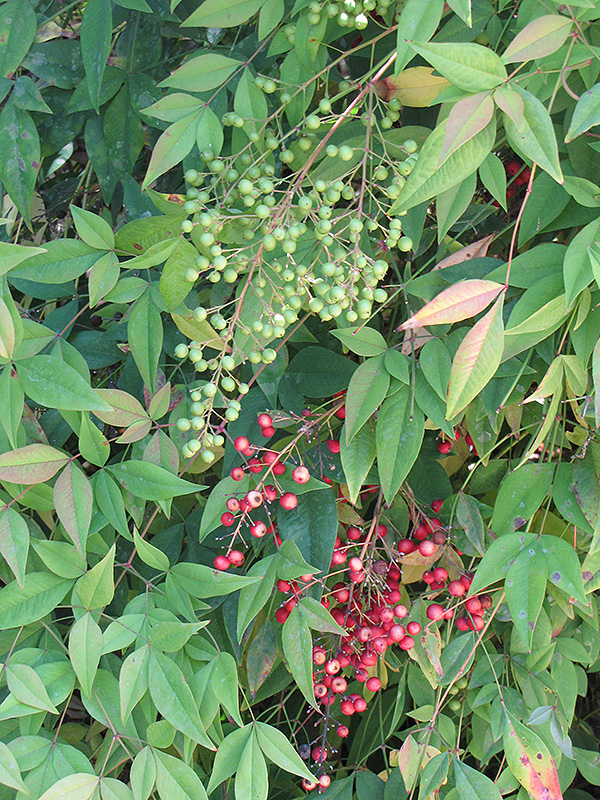Plant Finder
Height: 8 feet
Spread: 5 feet
Sunlight:
![]()
![]()
Hardiness Zone: 5
Other Names: Heavenly Bamboo
Description:
A colorful, open evergreen shrub which features bright red berries and interesting grass-like foliage which emerges tinted with deep red in spring; very upright and leggy, excellent in mass plantings for color and textural effect
Ornamental Features
Nandina is primarily grown for its highly ornamental fruit. It features an abundance of magnificent red berries from early fall to late winter. It has attractive bluish-green evergreen foliage which emerges burgundy in spring. The pointy bipinnately compound leaves are highly ornamental and remain bluish-green throughout the winter. It has masses of beautiful panicles of white flowers with yellow anthers rising above the foliage from mid to late spring, which emerge from distinctive pink flower buds, and which are most effective when planted in groupings. The smooth bark and brick red branches are extremely showy and add significant winter interest.
Landscape Attributes
Nandina is a multi-stemmed evergreen shrub with an upright spreading habit of growth. Its relatively fine texture sets it apart from other landscape plants with less refined foliage.
This is a relatively low maintenance shrub, and is best pruned in late winter once the threat of extreme cold has passed. Gardeners should be aware of the following characteristic(s) that may warrant special consideration;
- Suckering
Nandina is recommended for the following landscape applications;
- Mass Planting
- General Garden Use
- Container Planting
Planting & Growing
Nandina will grow to be about 8 feet tall at maturity, with a spread of 5 feet. It tends to be a little leggy, with a typical clearance of 2 feet from the ground, and is suitable for planting under power lines. It grows at a medium rate, and under ideal conditions can be expected to live for approximately 30 years.
This shrub does best in a location that gets morning sunlight but is shaded from the hot afternoon sun, although it will also grow in full shade. Keep it away from hot, dry locations that receive direct afternoon sun or which get reflected sunlight, such as against the south side of a white wall. It is very adaptable to both dry and moist locations, and should do just fine under average home landscape conditions. It may require supplemental watering during periods of drought or extended heat. It is not particular as to soil type or pH. It is highly tolerant of urban pollution and will even thrive in inner city environments. This species is not originally from North America.
Nandina makes a fine choice for the outdoor landscape, but it is also well-suited for use in outdoor pots and containers. With its upright habit of growth, it is best suited for use as a 'thriller' in the 'spiller-thriller-filler' container combination; plant it near the center of the pot, surrounded by smaller plants and those that spill over the edges. It is even sizeable enough that it can be grown alone in a suitable container. Note that when grown in a container, it may not perform exactly as indicated on the tag - this is to be expected. Also note that when growing plants in outdoor containers and baskets, they may require more frequent waterings than they would in the yard or garden.


